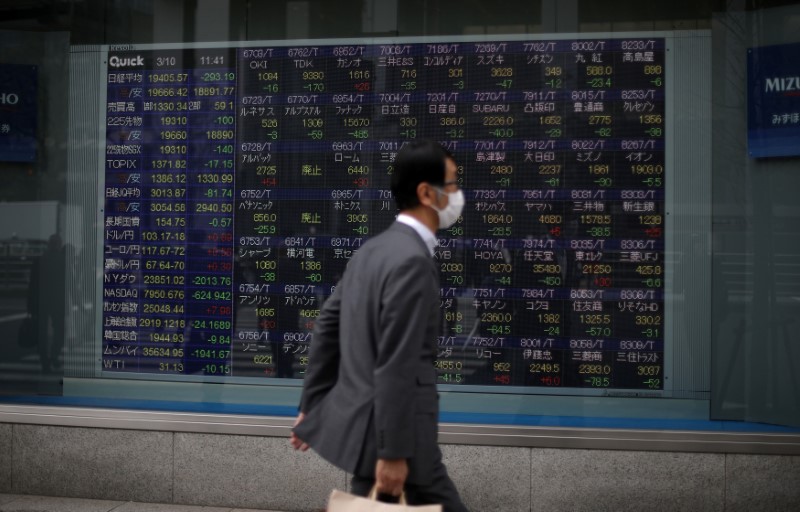By Herbert Lash
NEW YORK (Reuters) - Asian shares faced another leg lower on Wednesday as the coronavirus sharply slows global growth, leading a gauge of world stocks to post its biggest quarterly decline in more than a decade and oil prices to trade near lows last seen in 2002.
Shares on Wall Street tumbled on Tuesday, with the Dow registering its biggest quarterly fall since 1987 and the S&P 500 its steepest quarterly drop since a decade ago on growing evidence of the massive downturn the pandemic will incur.
E-Mini futures for the S&P 500 (ESc1) traded 1% lower in after-hours trade, while Asian futures suggested the rout would continue.
FTSE China A50 futures (SFCc1) in Singapore were down 0.85% and Japan's Nikkei (N225) fell 1.86% in early trade.
The first-quarter decline was the biggest on record for the S&P 500 as consumers hunkered down at home, leading businesses to announce massive staff furloughs and to shut temporarily.
U.S. economic activity is likely to be "very bad" and the unemployment rate could rise above 10% because of efforts to slow the spread of the coronavirus, Cleveland Federal Reserve Bank President Loretta Mester told CNBC.
The United States marked 700 deaths in a single day from COVID-19 for the first time on Tuesday, lifting total U.S. fatalities from the disease to more than 3,700.
MSCI's broadest index of Asia-Pacific shares outside Japan (MIAPJ0000PUS) gained 0.35% in early trade.
MSCI's gauge of stocks across the globe (MIWD00000PUS) shed 0.48% following modest gains in Europe. The index fell nearly 22% for the quarter.
Bucking the broader decline, Australian shares opened higher as a slowdown in new coronavirus cases brightened investor sentiment while rising iron ore prices gave miners a lift.
Australia's S&P/ASX 200 index (AXJO) rose 1.59% after the benchmark fell 2% on Tuesday.
The number of coronavirus infections globally headed toward 800,000. Deutsche Bank (DE:DBKGn) analysts noted, however, that for two consecutive days the global growth in new cases was below 10%, having exceeded that rate for most of the past two weeks.
Health officials were much more cautious. A World Health Organization official warned that even in the Asia-Pacific region, the epidemic was "far from over."
The dollar slid against a basket of currencies, pressured by the latest Federal Reserve measures to ensure sufficient liquidity in the global financial system.
The Fed is now allowing foreign central banks to exchange their holdings of U.S. Treasury securities for overnight dollar loans.
The dollar index (=USD) fell 0.275% while the Japanese yen
Government bond yields held steady as investors remained cautious about buying riskier assets.
The benchmark 10-year U.S. Treasury note (US10YT=RR) rose 15/32 in price to yield 0.6538%.
Crude oil benchmarks ended a volatile quarter with their biggest losses in history, with both U.S. and Brent futures hammered throughout March due to the pandemic and the eruption of the Saudi-Russia price war.
Global fuel demand has been sharply cut by travel restrictions due to the coronavirus. Forecasters at major merchants and banks see demand slumping by 20% to 30% in April, and for weak consumption to linger for months.
Crude futures ended the quarter down nearly 70% after record losses in March.

U.S. crude